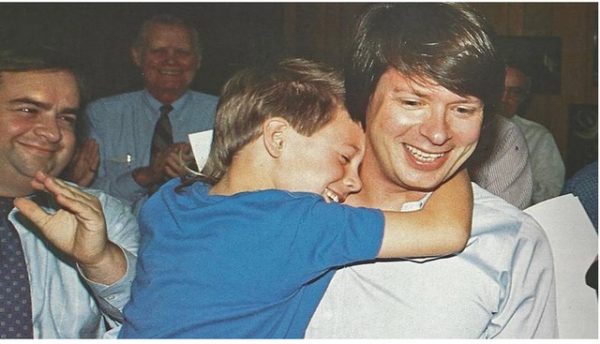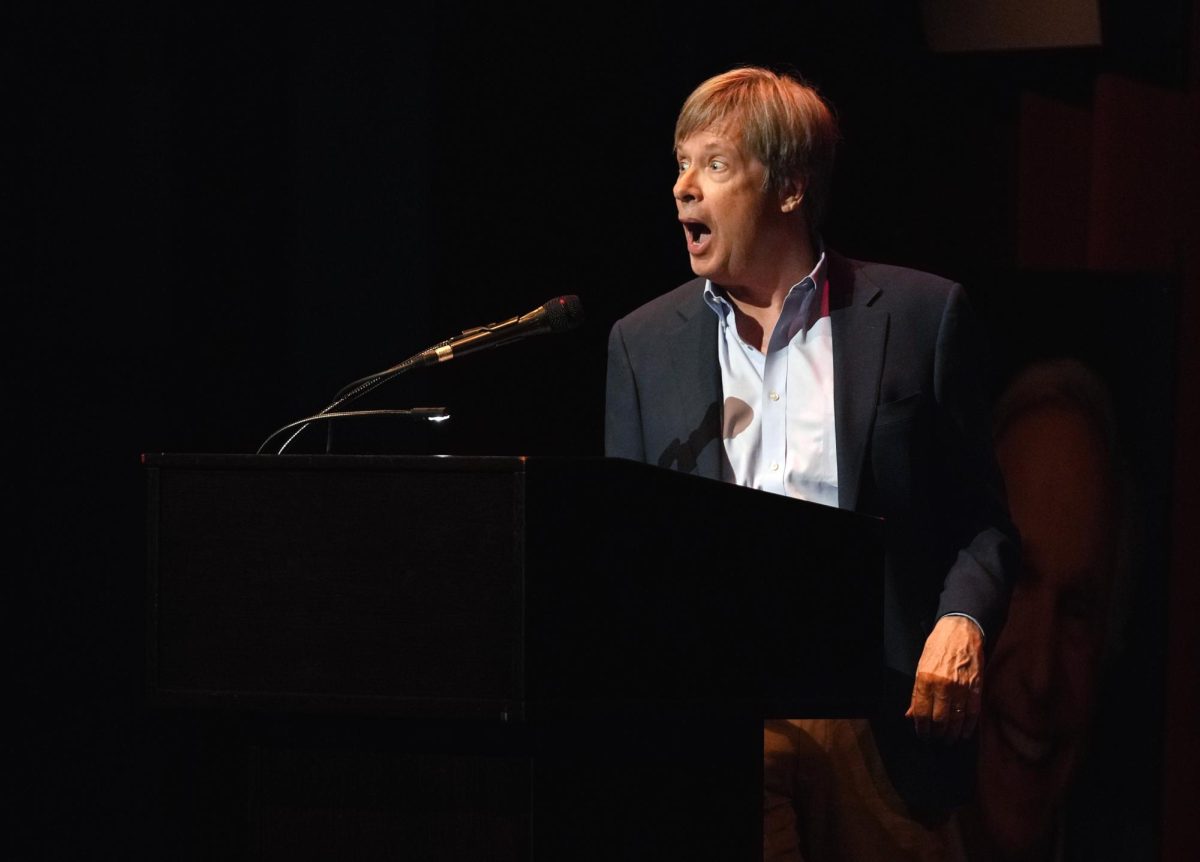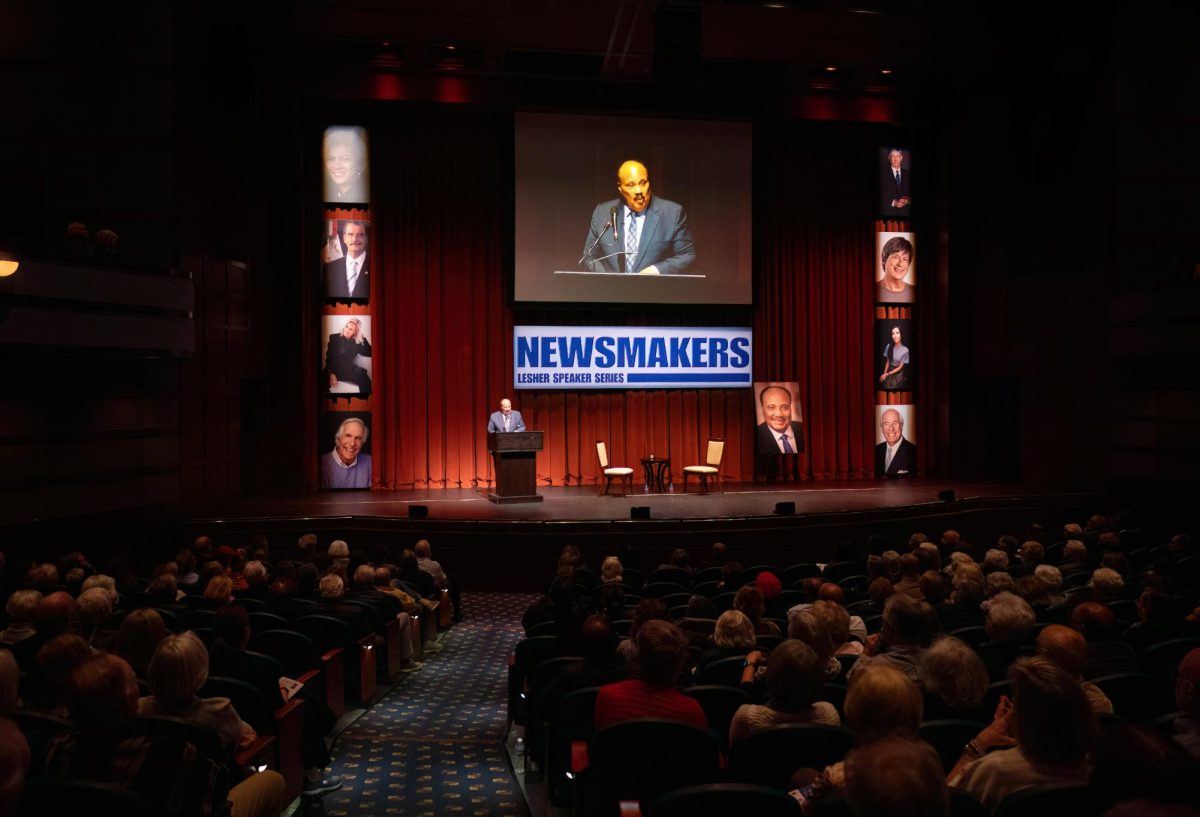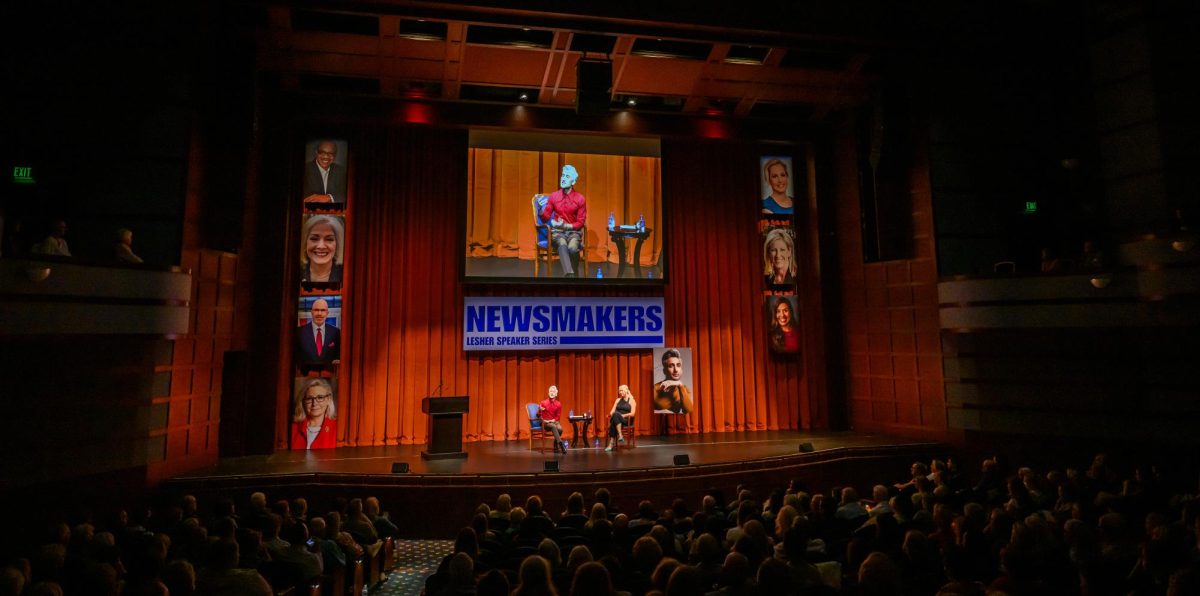Nearly 800 people packed the Lesher Center’s Hofmann Theatre on May 13 as Pulitzer Prize-winning humorist Dave Barry took the stage, delivering a laughter-filled performance that touched on everything from picking up his son in the Oscar Mayer Wienermobile to publicizing International Talk Like a Pirate Day to scheming to rename North Dakota to just Dakota, reaffirming his place as one of America’s most celebrated comedic voices.
“If you don’t learn anything else from me tonight — and trust me, you will not — learn this: do not mess with North Dakota,” Barry said as the audience burst into laughter. “If you go to Grand Forks, North Dakota, for any reason, such as if your plane crashed there, there is a brick building and it says Dave Barry, Lift [sewage] Station Number 16.”
As the seventh speaker in the 20th annual Lesher Foundation’s Newsmakers: Speaker Series, which is celebrating its anniversary by bringing back several notable past guests, Barry emphasized the importance of humor in today’s world and marked the release of his new memoir, “Class Clown: The Memoirs of a Professional Wiseass: How I Went 77 Years Without Growing Up,” which hit booksellers earlier that day.
Barry, who is most known for writing a humor column for the Miami Herald for 22 years, originally appeared at the series’ second annual event two decades ago.
Barry’s tour for his new book reached the Bay Area on May 12 before heading all over the nation, with Barry subsequently visiting Phoenix, Chicago, Rhode Island, and other places before wrapping up back in California later this month.
“The random cities generator generated the order of my book tour,” Barry said jokingly.
Each speaker event features a local nonprofit making an impact in the Bay Area community. For Barry’s appearance, the spotlight was on Pogo Park, a Richmond-based organization dedicated to transforming marginalized and underfunded areas of the city’s “Iron Triangle” into clean, revitalized parks.
“The world is scary and dangerous and unpredictable, and ends in death, and [humans are] the only species that knows that,” Barry said. “Humor is a necessary component of human psychology that we developed to deal with the world, and people who just can’t laugh, I feel sorry for those people.”
The crowd roared with laughter as Barry delivered a fast-paced, joke-filled monologue packed with his signature humor, before sitting down for a lively conversation with “hometown favorite” KTVU Fox 2 anchor Frank Mallicoat.
“Two of Barry’s books were the roots for a CBS sitcom ‘Dave’s World,’ which is still available on cable in some third world countries,” Mallicoat said. “Dave Barry has been a professional humorist ever since he discovered that professional humor was a lot easier than working day to day.”
Barry discussed his process when it comes to writing columns that discuss and make fun of the absurdities of daily life. Barry is known for his “Year in Review” columns, where he examines each year the most stupid things that happened, such as a banana selling for $6.2 million at an art auction last year.
“Humor is mostly just observing what’s going on around you. I think most of the things that people find most funny are not weird, exotic topics that would just scream out, ‘Well, this is weird and exotic, so you should write a column.’ It’s more like things that everybody has dealt with,” Barry said during an interview before the show. “It might just be like you were at the grocery store and you’re annoyed because it used to be just orange juice and now it’s low pulp, high pulp. There’s some really annoying things that happen and then, ultimately, you kind of deal with your frustration and anger by writing about it later on.”
Barry said that over the past few decades, humor has become less literary and implemented more into short-form content. He said humor has evolved to be more political to attack the other side rather than to entertain people.
“There aren’t many newspapers left, so there’s not a lot of columnists left. So, people have turned to other media: the written humor tends to be very short, punchy, like memes and Twitter,” Barry said. “It’s also got more political. It feels like people need to pick a side, and you’ll only use your humor as a weapon to attack the other side, rather than to entertain everybody, which was more the point when I started.”
During the one-and-a-half hour event, Barry made it clear that his humor wasn’t about politics.
“I’m not gonna judge everybody’s politics, but I think you always look at the brighter side. We worry about going to war with Russia and China, but it really doesn’t look like it’s gonna happen. It looks like we’re gonna go to war with Canada,” Barry said. “And we can take them. We can do that by Uber. That’s as political as I intend to get tonight.”
As a writer, Barry said he “rewrites every sentence 300 times,” and that writing, especially journalistic writing, is supposed to be hard. Barry decided to go down the humor route in journalism after realizing that being humorous was his strong suit, especially after a particularly embarrassing interaction with former first lady Barbara Bush when he explained how he shopped at the same supermarket as her son, Jeb.
“It was then when I realized I was terrible at that basic function of just talking to people,” Barry said. “The main thing is you gathering information, talking to people. A lot of times, these are people who don’t want to talk to you, and you have to talk to people who are hostile to you, or intimidating, and if you’re not good at dealing with that, you’re not gonna be good at journalism.”

Barry switched to humor after realizing that he wouldn’t succeed being a “newspaper person,” saying that “humor is just sitting around in your underwear and making things up, like being a consultant.” But Barry acknowledged that good writing is supposed to be hard.
“With writing, if it’s easy you’re probably not very good at it,” Barry said. “Except, maybe Stephen King can do that.”
In addition to his writing career, Barry was also a founding member of the Rock Bottom Remainders, a band made up entirely of bestselling authors. Formed in the early 1990s, the group included literary heavyweights such as King, Amy Tan, and Mitch Albom.
“We are a bunch of good authors, but we suck musically. We played hard-listening music,” Barry said. “I call it the rumor method of music, which is to say everybody’s playing a chord, and then rumor goes around the band that there’s been a chord change, not everybody hears that change at the same time, and nobody knows it.”
Barry fondly recalled a story when the band was in a hotel bar after playing a show with bandmate and writer Scott Turow, who was retelling his story of how he lost his spleen. In response to Barry’s constant questioning if Turow still had a spleen, Turow wrote, “NO SPLEEN” on Barry’s arm. When Barry woke up the next morning, he saw “NO SPLEEN” written on his arm, but had no memory of the previous night.
“I looked down and it said, ‘NO SPLEEN.’ And, you know that urban legend about the salesman in the hotel who wakes up the next morning, he finds a note that says, ‘We’ve harvested your kidney?’” said Barry as the crowd roared in laughter. “For just a few seconds in New York City, I’m thinking, ‘Oh my god, they harvested my spleen.’ And I don’t even know where to look [for the spleen]. I still don’t know, really.”
In 1988, Barry won the Pulitzer Prize for distinguished commentary for his columns in the Miami Herald.
“Honestly, no one has ever accused me of writing a distinguished commentary,” Barry said.
On the day the prize winners were to be announced, Barry was preparing to take his then 7-year-old son, Rob, to Key West, Florida. Barry received a call from his editor about a spontaneous meeting in the Miami Herald newsroom, where the staff was going to surprise Barry with an announcement of his award.
“I turned to Rob, and when I said no more Key West, his face fell. So I said, ‘I’ll buy you a Nintendo.’ He was bugging me to buy this Nintendo game,” Barry said. “[Rob] hugs me right as they announce the Pulitzer and take the picture. The next day, on the front page of the Herald are two Pulitzers: one of them is Michel du Cille being congratulated by his colleagues, and the other is me with my son with his arms around my neck, with a huge smile on his face.”
Barry recalled that while his colleagues thought his son was ecstatic about his father’s Pulitzer Prize, the real reason Rob was excited was because of his new Nintendo game. Rob Barry is now a Pulitzer Prize-winning editor of the Wall Street Journal.
“[The Pulitzer Prize] looks like a graduation diploma from junior high school,” Barry said.
The audience was hooked during the speaker event, and many people said they have been Dave Barry fans, reading his dozens of books, columns, and other humorous works that have captivated America’s humor lovers for decades.
“I just think [Barry] has a genuine approach to what’s going on in the world, and he’s not afraid to just be funny,” said Janet Kennedy of Martinez. “My favorite part was hearing about his family, because I don’t think I ever remember hearing about his parents, because I think humor comes from somewhere.”
Faith Barnidge of Concord also enjoyed hearing about Barry’s family.
“Personal stories, I think, help you feel closer to celebrities and identify with them more than what they do,” Barnidge said. “So, it was nice getting that personal touch.”
Barry explained that his humor came from his parents and childhood as a class clown, which is where the title of his new memoir comes from.
“I was actually elected class clown for my high school class in 1965, and I thought I was sort of a wiseass in school,” Barry said. “I had a little bit of a discipline problem. I was told more than once by more than one teacher, ‘That’s very funny, but you can’t joke your way through life.’ Which turns out to be not true. I joked my way through life.”

Barry recalls being critical of what his junior high school taught them, from teaching girls to make cookies in home economics to teaching boys to “turn a piece of wood into a smaller piece of wood, and paint it brown” in shop class. He also questioned the school’s safety procedures.
“They said, ‘Dave, if there’s an atomic blast, you should get under the desk,’” Barry recalled. “Which, you know, it seems stupid now. Back then, it seemed really stupid. If the desk will protect us from the atomic blast, why not just put a big desk over the whole city?”
Barry also spoke fondly of his grandchildren, who, to Barry’s dismay, like playing on the floor.
“When you’re 77 years old, the floor is like North Korea,” Barry said. “You do not go there on the spur of the moment. You have no way back.”
Barry said that while humor has changed over the years, it still remains a source of joy and emphasized that now more than ever it is important in today’s world. Barry also said that humor writers are different from journalists in the way that they have the pressure to be funny and appeal to different audiences.
“If [students] want to be in journalism, they should not be talking to me,” Barry said. “But if they wanted to do humor, I always thought that humor should be funny. I had a lot of people send me their humor writing and a lot of times it’s just not funny. What makes it really different from other kinds of writing is that you kind of promise a result and it’s humor. If you say you’re a humor writer and it’s not funny, anybody can say you’re not funny.”
Keerthi Eraniyan is a 10th grader at California High School in San Ramon. This story was made possible by support from the Lesher Foundation, its Newsmakers speaker series, and the Bay City News Foundation. Stories are produced independently by the CCYJ news team.









